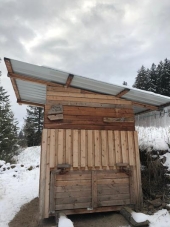




Davin Hoyt wrote:I just got into 3D printing, and I am really good with SketchUpPro.
I would like to put some files on the permies digital market.
Do you see any needs amongst the permies community?
I have spotted two 3D printing needs thus far:
1) urine diverter for a saw dust 5 gallon bucket toilet.
2) all-in-one sewing kit holder shaped like an acorn.
I think it would be cool if permies digital market had a section for 3D print files.
People could buy a file, start the print, and have the item when they wake up the next morning.



Jason Learned wrote:
paul wheaton wrote:here is a podcast i recorded with glenn kangiser - the builder of one of the largest and best documented builds.
https://permies.com/t/18654/Podcast-Glenn-Kangiser-Oehler-Structures
Sad to see that he died last Summer. Was a great podcast and I've used linseed oil to harden cob because of it. Thanks to both of you.
Jason


Jim Fry wrote:I am probably older than anyone else who has answered this question. In my case, in looking back on a rather long life, my conclusion as to what to do if suddenly having a significant amount of money is, ...
You get one chance to change the course of your family's history. If you are like me, it is not really necessary to change one single immediate thing. A new or newer tractor, a pool, vacation, nicer tools, things, only last so many years, then are "gone". There is only one that your descendants could make use of to improve their lives. Land. Get the best land with the best soil and the best water, in the best surrounding community, with the least likelihood of being overrun by city folks moving in. I would move as close to old order Amish I could. They live as close to self-sufficient lives as is currently happening in the U.S. I would not move anywhere on a line between two cities. Eventually there will be a freeway built between them, and there goes the neighborhood. I would set up a family trust so the land can never be divided. And with the left-over money, I would set up some sort of account to provide the land tax money far into the future. Land is the only thing there will never be more of. If you have land, and work hard, all the other things you desire, covet, want, will come to you. But the land comes first. Keep it safe from government, teach your children to live well and productive, make your best guess to avoid being overrun by new neighbors, and you can hopefully die knowing you did your best for the family you leave behind.
Leo Sharashkin wrote:Pearl, there were actually several articles in American Bee Journal (the most recent in Aug. 2019 issue) about keeping bees in Layens horizontal hives in Florida - beekeepers really love them.
You are correct, good insulation is as important in hot climates as in cold ones. I'm finding that the best design in Southern Missouri conditions is a double-wall Layens hive with 1.5" of natural wool insulation in the walls and bottom, and with ventilated attic space (filled with a wool pillow for the winter, the Layens way). In the Layens hive, the air gets into the attic space through a small gap after the last frame (which you should not close - it is beneficial for ventilation. The wintering setup is shown in Chapter 24 in Layens's Keeping Bees in Horizontal Hives and also in Keeping Bees with a Smile. These techniques have worked very well for me.
